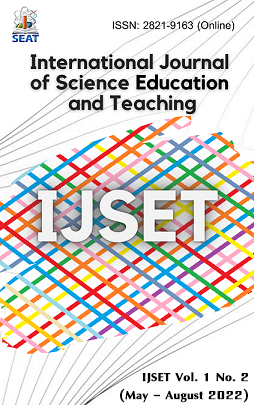Physics Teachers’ Technological Pedagogical Content Knowledge and Problems in the Instructional Management under the Secondary Educational Service Area Office Sukhothai in the Situation of Coronavirus Pandemic
Main Article Content
Abstract
The COVID-19 pandemic has changed education to integrate more technology in classroom. Technological Pedagogical Content Knowledge (TPACK) is an essential framework that teachers need to know in order to teach with technology effectively. This study examined the TPACK and problems in the instructional management during the COVID-19 pandemic held by 16 physics in-service teachers who teach at schools under the secondary educational service area office Sukhothai. Data sources consisted of questionnaires from 16 teachers and semi-structured interview with 5 teachers. Content analysis was used in data analysis and peer debriefing was used for ensure the trustworthiness in this study. This result revealed that these in-service physics teachers do not have appropriate technological pedagogical content knowledge. They have content knowledge, pedagogical knowledge, pedagogical content knowledge and technological knowledge at good level but, they have technological content knowledge, technological pedagogical knowledge and technological pedagogical content knowledge at low level. In addition, while the COVID-19 pandemic, most schools offered online teaching. Most physics teachers have incomplete level of technological pedagogical content knowledge. The problems that the teachers identified that they encountered in their teaching are 1) In terms of learning management, teachers are unable to manage teaching and learning that emphasizes students' inquiry because the students could not do the experiment or do activities that focus on inquiry, thus the teaching focus solely on Lecture 2) Teachers are unable to integrate the technology in their teaching. and 3) Students are not ready for online teaching, due to lack of learning equipments including computers, telephones and internet.
Article Details

This work is licensed under a Creative Commons Attribution-NonCommercial-NoDerivatives 4.0 International License.
References
Anupong Kanthiwong. (2020). Creating Multiple Choice Exams for Online Exams in the Situation of COVID-19 pandemic. Army Medical Practitioner, 73(2), 125-129.
Alison Gopnik. (2019). “Kids are smarter than adults when solving certain problems” berkeley research university of California.
Cunningham, C. M., & Carlsen, W. S. (2014). Teaching engineering practices. Journal of Science Teacher Education, 25(2), 197-210.
Goldfarb, A., Pregibon, N., Shrem, J., & Zyko, E. (2011). Informational brief on social networking in education. Emerging Teaching & Learning Technologies Initiative. New York Comprehensive Center, Retrieved April, 26, 2013.
Guzey, S. S., & Roehrig, G. H. (2009). Teaching science with technology: Case studies of science teachers’ development of technology, pedagogy, and content knowledge. Contemporary Issues in Technology and Teacher Education, 9(1), 25-45.
Matthews, M. R. (1997). Science teaching: the role of history and philosophy of science. New York: Routledge.
Osborne, J. and Hennessy, S. (2003). Literature Review of ICT: Promise, Problems and Future Directions. Bristol: Futurelab.
Pruekpramool, C., and T. Sangpradit. (2016). Teaching physics in english: a continuing professional development for non-native english-speaking teachers in Thailand. Journal of Education and Learning, 5(2), 47-59.
Sadler, P. M., and Tai, R. H. (2001). Success in introductory college physics: the role of high school preparation. John Wiley & Sons, Inc.
Savasci, F., & Berlin, D. F. (2012). Science teacher beliefs and classroom practice related to constructivism in different school settings. Journal of Science Teacher Education, 23(1), 65-86.
Thammarat Saeton. (2021). The presence for online teaching of students under the COVID-19 epidemic situation : a case study of Prince of Songkla University Phuket Campus. Journal of Multidisciplinary Academic Research and Development, Vol. 3 No.2, 2021
Wittaya Wayo et al. (2020). Online teaching and learning under the situation of COVID-19 pandemic: concepts and applications of teaching and learning. Journal of Health Center 9: Journal of Health Promotion and Environmental Health. 14(34), 285-298


